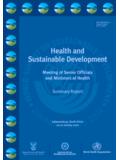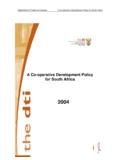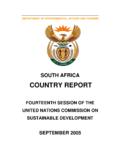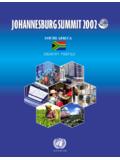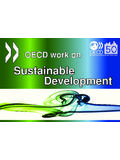Transcription of Health and Sustainable Development: Addressing …
1 Health and Sustainable development : Addressing the Issues and ChallengesWHO Background Paper prepared for the World Summit on Sustainable DevelopmentJohannesburg, South Africa26 August 4 September 2002 World Health OrganizationWHO/HDE/ : EnglishDistr.: LimitedCopyright World Health Organization 2002 This document is not issued to the general public, and all rights are reserved by the World HealthOrganization (WHO). The document may not be reviewed, abstracted, quoted, reproduced or translated, inpart or in whole, without the prior written permission of WHO. No part of this document may be stored in aretrieval system or transmitted in any form or by any means - electronic, mechanical or other - without theprior written permission of WHO.
2 The views expressed in this document by named authors are solely the responsibility of those Health OrganizationHealth and Sustainable development : Addressing the Issues and ChallengesWHO Background Paper prepared for the World Summit on Sustainable DevelopmentJohannesburg, South Africa26 August 4 September 2002 World Health OrganizationHealth and Sustainable development : Addressing the Issues and Challenges1 The document was written by Yasmin von Schirnding and Catherine Mulholland ofWHO, would like to thank the various Departments at headquarters and regionaloffices for their valuable contributions, as well as Jo Trevalyan for her assistancein editing the emergence of the concept of Sustainable development as a guiding principlefor policy formulation, the adoption at the UN Conference on Environment andDevelopment (UNCED)
3 In 1992 of Agenda 21, and subsequent adoption of theProgramme for the Further Implementation of Agenda 21, have been importantstimuli at international, national and local levels, for innovative programmes ofaction to address current environment, Health and development problems. TheRio Declaration, for example, states that, Human beings are at the centre ofconcerns for Sustainable development . They are entitled to a healthy andproductive life in harmony with nature. Further, Chapter 6 of Agenda 21emphasizes the fundamental commitment within Sustainable development to protecting and promoting human Health .Recent international meetings have reinforced the importance of Health ,environment and development issues on the international development the first time, meetings of the G8, the United Nations Security Council, theWorld Economic Forum, the OECD, as well as follow-up to major internationalconferences have explicitly addressed Health issues requiring attention asdevelopment or security issues.
4 Health has, in effect, become recognized as acentral concern in development both as a resource for, and as an indicator of, Sustainable Commission on Macroeconomics and Health , appointed by WHO, hasassembled powerful evidence suggesting that the role played by Health indetermining the economic prospects of the world's poor communities has beensignificantly underestimated. Recent evidence shows how disease undermineseconomic progress. Major diseases, such as HIV/AIDS, malaria and TB directlyaffect the poorest countries' ability to develop. They function as a drag oneconomic growth and they perpetuate poverty. Childhood illnesses and maternalmorbidity and mortality keep the most vulnerable groups trapped in viciouscycles of deprivation and major shift in thinking regarding the role of Health in poverty reduction anddevelopment is occurring.
5 Health is far more central to poverty reduction thanpreviously thought, and that realization is now beginning to shape governments'and global policies. It has been known for years that people who are poor aremore likely to get sick. But now knowledge is accumulating about how ill healthHealth and Sustainable development : Addressing the Issues and Challenges2creates and perpetuates poverty, triggering a vicious cycle which hamperseconomic and social development and contributes to unsustainable resourcedepletion and environmental degradation. Evidence suggests that Health gainstrigger economic growth: if the benefits of that growth are equitably distributed,this can lead to poverty Millennium Declaration, adopted unanimously by world leaders in September2000, sets a number of inter-related goals and targets which are based onprinciples of Sustainable development and are aimed at making further progressin eradicating poverty and advancing healthy and Sustainable humandevelopment.
6 In addition to these commitments, Health , sustainabledevelopment and poverty reduction is being addressed at country level incomprehensive development strategy and planning tools such as the UnitedNations Common Country Assessments (CCAs) and the United NationsDevelopment Assistance Frameworks (UNDAFs). Health and Sustainable development : Addressing the Issues and Challenges3 The Need for Intersectoral ActionCountries face a myriad of Health -related problems relating on one hand topoverty and a lack of access to basic services/resources, and on the other tolarge-scale, rapid industrialisation, urbanisation, demographic change, andtechnological development .
7 The problems facing the Health sector today areincreasingly complex, multidisciplinary in nature, often ill-defined, and haveuncertain solutions. While the Health sector itself is changing to respond to manyof these challenges, it cannot address these problems on its own. Many of thekey determinants and solutions to Health and disease lie outside the direct realmof the Health sector, in sectors concerned with environment, water andsanitation, agriculture, education, employment, urban and rural livelihoods,trade, tourism, industrial development , energy and housing. Addressing theunderlying determinants of Health through intersectoral efforts is key to ensuringsustained Health improvements and ecologically Sustainable main Health goal of governments and of WHO was declared in 1977, to be: Attainment by all the people of the world by the year 2000 of a level of healththat will permit them to lead a socially and economically productive life.
8 However, various trends, including globalization of trade, travel and technology,urbanization and the growth of megacities, widening gaps between rich and poor,the continuing burden of infectious diseases, the rise in non-communicablediseases, and growth in environmental threats, made a reassessment of this Health for All (HFA) strategy necessary in renewed Health for All in the 21st Century , strategy adopted at the WorldHealth Assembly in 1998 set out global priorities and targets for the first twodecades of the 21st century, which aim to create the conditions for peopleworldwide to reach and maintain the highest attainable level of healththroughout their lives.
9 The strategy is based on the principles of social justice,equity and human development , and emphasises the prevention of ill- Health ,minimisation of Health risks and promotion of population Health . Conceived inthese terms, the improvement of Health requires more than the servicesdelivered by the Health sector alone; the contribution of other sectors is explicitlyrecognized as vital for improving the Health and well-being of the is emphasised in WHO s corporate strategy which establishes the goals ofbuilding healthy populations and communities and combating ill- Health throughthe adoption of four strategic approaches: Reducing excess mortality, morbidity and disability, especially in poor andmarginalized populations.
10 Promoting healthy lifestyles and reducing factors of risk to human Health thatarise from environmental, economic, social and behavioural causes. Developing Health systems that equitably improve Health outcomes, respondto peoples legitimate demands, and are financially fair. Developing an enabling policy and institutional environment in the healthsector, and promoting an effective Health dimension to social, economic,environmental and development and Sustainable development : Addressing the Issues and Challenges4 Intersectoral Planning at National LevelWhile there are shared global and transnational problems, each country, regionand community faces its own unique problems, the solutions to which aredetermined by many factors, including resources, customs, institutions andvalues.










